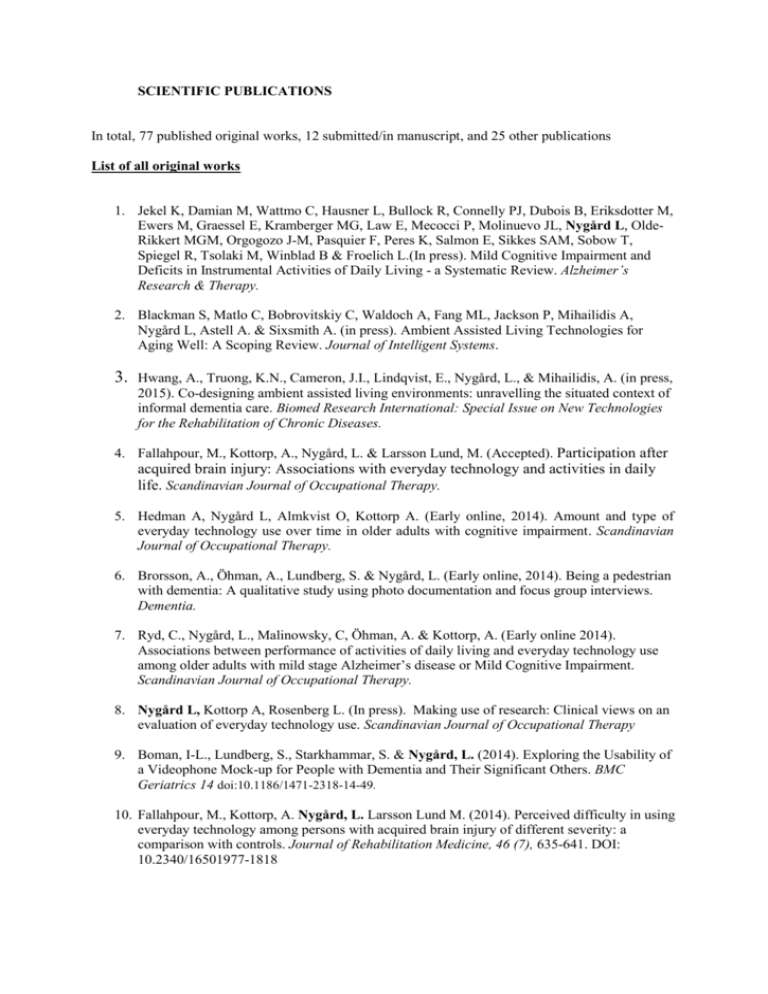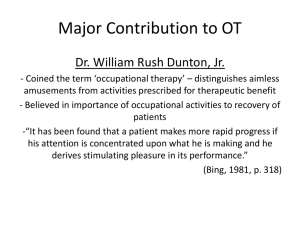scientific publications
advertisement

SCIENTIFIC PUBLICATIONS In total, 77 published original works, 12 submitted/in manuscript, and 25 other publications List of all original works 1. Jekel K, Damian M, Wattmo C, Hausner L, Bullock R, Connelly PJ, Dubois B, Eriksdotter M, Ewers M, Graessel E, Kramberger MG, Law E, Mecocci P, Molinuevo JL, Nygård L, OldeRikkert MGM, Orgogozo J-M, Pasquier F, Peres K, Salmon E, Sikkes SAM, Sobow T, Spiegel R, Tsolaki M, Winblad B & Froelich L.(In press). Mild Cognitive Impairment and Deficits in Instrumental Activities of Daily Living - a Systematic Review. Alzheimer’s Research & Therapy. 2. Blackman S, Matlo C, Bobrovitskiy C, Waldoch A, Fang ML, Jackson P, Mihailidis A, Nygård L, Astell A. & Sixsmith A. (in press). Ambient Assisted Living Technologies for Aging Well: A Scoping Review. Journal of Intelligent Systems. 3. Hwang, A., Truong, K.N., Cameron, J.I., Lindqvist, E., Nygård, L., & Mihailidis, A. (in press, 2015). Co-designing ambient assisted living environments: unravelling the situated context of informal dementia care. Biomed Research International: Special Issue on New Technologies for the Rehabilitation of Chronic Diseases. 4. Fallahpour, M., Kottorp, A., Nygård, L. & Larsson Lund, M. (Accepted). Participation after acquired brain injury: Associations with everyday technology and activities in daily life. Scandinavian Journal of Occupational Therapy. 5. Hedman A, Nygård L, Almkvist O, Kottorp A. (Early online, 2014). Amount and type of everyday technology use over time in older adults with cognitive impairment. Scandinavian Journal of Occupational Therapy. 6. Brorsson, A., Öhman, A., Lundberg, S. & Nygård, L. (Early online, 2014). Being a pedestrian with dementia: A qualitative study using photo documentation and focus group interviews. Dementia. 7. Ryd, C., Nygård, L., Malinowsky, C, Öhman, A. & Kottorp, A. (Early online 2014). Associations between performance of activities of daily living and everyday technology use among older adults with mild stage Alzheimer’s disease or Mild Cognitive Impairment. Scandinavian Journal of Occupational Therapy. 8. Nygård L, Kottorp A, Rosenberg L. (In press). Making use of research: Clinical views on an evaluation of everyday technology use. Scandinavian Journal of Occupational Therapy 9. Boman, I-L., Lundberg, S., Starkhammar, S. & Nygård, L. (2014). Exploring the Usability of a Videophone Mock-up for People with Dementia and Their Significant Others. BMC Geriatrics 14 doi:10.1186/1471-2318-14-49. 10. Fallahpour, M., Kottorp, A. Nygård, L. Larsson Lund M. (2014). Perceived difficulty in using everyday technology among persons with acquired brain injury of different severity: a comparison with controls. Journal of Rehabilitation Medicine, 46 (7), 635-641. DOI: 10.2340/16501977-1818 11. Nygård, L. & Kottorp, A. (2014). Engagement in IADLs, social activities and use of everyday technology in older adults with and without cognitive impairment. British Journal of Occupational Therapy, 77(11),565-573. 12. Larsson Lund, M., Nygård, L. & Kottorp, A. (2014). Perceived difficulty in the use of everyday technology: Relationships to everyday functioning in people with acquired brain injury with a special focus on returning to work. Disability and Rehabilitation, 36 (19), 16181625. 13. Malinowsky C, Nygård L, Kottorp A. (2014). Using a screening tool to predict potential use of e-health services for older people with and without cognitive impairment. Ageing and Mental Health, 18 (3), 340-345. doi:10.1080/13607863.2013.832731 14. Hällgren, M., Nygård, L. & Kottorp, A. (2014). Everyday technology use among people with intellectual disability – relevance, perceived difficulty, and influencing factors. Scandinavian Journal of Occupational Therapy (ahead of print). 15. Malinowsky, C., Rosenberg, L. & Nygård, L. (Accepted). An approach to facilitate the readiness of healthcare professionals to support technology use in everyday life for persons with dementia. Scandinavian Journal of Occupational Therapy. 16. Patomella, A-H., Kottorp, A. & Nygård, L. (2013). Design and management features of everyday technology that challenge older adults. British Journal of Occupational Therapy, 76(9), 390-397. DOI: 10.4276/030802213X13782044946229 17. Malinowsky, C., Kottorp, A. Nygård, L. (Accepted). Everyday technologies’ levels of challenge when used older adults with and without cognitive impairment – comparison of selfperceived versus observed difficulty estimates. Technology and Disability, 25 (3), 167-176. doi: 10.3233/TAD-130380 18. Hedman, A., Nygård, L., Almkvist, O. & Kottorp, A. (2013). Patterns of functioning in older adults with mild cognitive impairment: A two-year study focusing on everyday technology use. Aging and Mental Health, 17(6), 679-88. DOI: 10.1080/13607863.2013.777396. 19. Rosenberg, L., & Nygård, L. (E-published ahead of print March 26, 2013). Learning and using technology in intertwined processes: A study of people with MCI/AD. Dementia. DOI:10.1177/1471301213481224 20. Boman, IL., Nygård, L., Lundberg, S., Rosenberg, L. (Accepted). Users´ and professionals´ contributions in the process of designing an easy-to-use videophone for people with dementia. Disability and Rehabilitation: Assistive Technology. 21. Brorsson, A., Öhman, A., Cutchin, M. & Nygård, L. (2013). Managing critical incidents in grocery shopping as perceived by people with Alzheimer’s disease. Scandinavian Journal of Occupational Therapy, 20, 292-301. DOI: 10.3109/11038128.2012.752031. 22. Lindqvist, E., Nygård, L. & Borell, L. (Accepted). Significant junctures on the way towards becoming a user of assistive technology in Alzheimer’s disease. Scandinavian Journal of Occupational Therapy. DOI: 10.3109/11038128.2013.766761. 23. Patomella, A-H., Kottorp, A., Malinowsky, C. & Nygård, L. (2011). Factors that impact the level of difficulty of everyday technology in a sample of older adults with and without cognitive impairment. Technology and Disability, 23, 243-250. 24. Malinowsky, C., Almkvist, O., Nygård, L. & Kottorp, A. (2012). Individual variability and environmental characteristics influence older adults’ abilities to manage everyday technology. International Psychogeriatrics, 24, 484-495. DOI: 10.1017/S1041610211002092. 25. Boman, I-L., Rosenberg, L., Lundberg, S., & Nygård, L. (2012). First steps in designing a videophone for people with dementia: identification of the users’ potentials and the requirements on the communication technology. Disability and Rehabilitation: Assistive Technology, 7 (5), 356-363. DOI: 10.3109/17483107.2011.635750 26. Borell, L., Nygård, L., Asaba, E., Gustavsson, A. & Hemmingsson, H. (2012). Qualitative Approaches in Occupational Therapy Research. Scandinavian Journal of Occupational Therapy, 19, (oct), 521-529. CI: 0 / DOI: 10.3109/11038128.2011.649782. 27. Nygård, L., Pantzar, M., Uppgard, B. & Kottorp, A. (2012). Detection of disability in older adults with MCI or Alzheimer’s disease through assessment of perceived difficulty in using everyday technology. Aging and Mental Health,16 (3-4), 361-371. DOI: 10.1080/13607863.2011.605055. 28. Brorsson, A., Öhman, A., Lundberg, S. & Nygård, L. (2011). Accessibility in public space as perceived by people with Alzheimer’s disease. Dementia, 10 (4), 587-602. 29. Hällgren, M., Nygård, L. & Kottorp, A. (2011). Technology and everyday functioning in people with intellectual disabilities: A Rasch analysis of the Everyday Technology Use Questionnaire (ETUQ). Journal of Intellectual Disability Research, 55(6), 610-620. DOI: 10.1111/j.1365-2788.2011.01419.x 30. Kottorp, A. & Nygård, L. (2011). Development of a short form assessment for everyday technology used with older adults with MCI or Alzheimer’s disease. Expert Review of Neurotherapeutics, 11(5), 647-655. DOI: 10.1586/ERN.11.55 31. Rosenberg, L., Kottorp, A. & Nygård, L. (2012). Readiness for technology use with people with dementia: Views of significant others. Journal of Applied Gerontology, 31(4),510-530. DOI: 10.1177/0733464810396873 32. Malinowsky, C., Almkvist, O., Kottorp, A. & Nygård, L. (2010). Ability to manage everyday technology: A comparison of persons with dementia or mild cognitive impairment and older adults without cognitive impairment. Disability & Rehabilitation: Assistive Technology, 5, 462-469. DOI: 10.3109/17483107.2010.496098 33. Rosenberg, L. & Nygård, L. (2012). Persons with dementia become users of assistive technology: A study of the process. Dementia, 11(2), 135-154. 34. Öhman, A., Nygård, L. & Kottorp, A. (2010). Occupational performance and awareness of disability in mild cognitive impairment or dementia. Scandinavian Journal of Occupational Therapy, 18; 133-142. DOI: 10.3109/11038121003645993 35. Fitinghoff, H., Lindqvist, B., Nygård, L. Ekholm, J. & Schult, M-L. (2011). The ICF and post-surgery occupational therapy following traumatic hand injury: a pilot study. International Journal of Rehabilitation Research, 34(1), 79-88.CI: 1 / DOI: 10.1097/MRR.0b013e328341946c 36. Malinowsky, C., Nygård, L., & Kottorp, A. (2011) Psychometric evaluation of a new assessment of the ability to manage technology in everyday life. Scandinavian Journal of Occupational Therapy, 18, 26-35. DOI: 10.3109/11038120903420606. 37. Nygård, L. (2009). The stove timer as a device for older adults with cognitive impairment or dementia: Different professionals’ reasoning and actions. Technology and Disability, 21, 5366. 38. Rosenberg, L., Kottorp, A., Winblad, B., & Nygård, L. (2009). Perceived difficulty in everyday technology use among older adults with or without cognitive deficits. Scandinavian Journal of Occupational Therapy, 16, 216-226. DOI: 10.3109/11038120802684299 39. Starkhammar, S. & Nygård, L. (2008). Using a timer device for the stove: Experiences of older adults with memory impairment or dementia and their families. Technology and Disability, 20, 189-191. 40. Hemmingsson, H., Lidström, H., & Nygård, L. (2009). The use of assistive technology devices in mainstream schools: the students´ perspective. American Journal of Occupational Therapy, 63,(4), 461-470. 41. Vik, K., Nygård, L. & Josephsson, S. (2009). Agency and engagement - Older adults´experiences of participation during home based rehabilitation. Canadian Journal of Occupational Therapy, 75(5), 262-271. 42. Nygård, L. (2008). The meaning of everyday technology as experienced by people with dementia who live alone. Dementia, 7(4), 481-502. 43. Vik, K., Nygård, L. & Lilja, M. (2009). Encountering staff in the home: Three older adults’ experience during six months of home-based rehabilitation. Disability and Rehabilitation 31(8), 619-629. DOI: 10.1080/09638280802242114. 44. Rosenberg, L., Nygård, L. & Kottorp, A. (2009). Everyday Technology Usage (ETUQ) – evaluation of the psychometric properties of a new assessment of competence in technology use. Occupational Therapy Journal of Research, 29 (2), 52-62. 45. Vikström, S., Josephsson, S., Stigsdotter-Neely, A. & Nygård, L. (2008). Engagement in occupations: experiences of persons with dementia and their caregiving spouses. Dementia, 7, 251-270. 46. La Cour, K., Josephsson, S., Tishelman, C. & Nygård, L. (2007). Lived experiences of creative activity for people in palliative care. Palliative & Supportive Care, 5, 241-250. 47. Öhman, A., Josephsson , S. & Nygård, L. (2008). Awareness through interaction in everyday occupations: Experiences of people with Alzheimer’s disease. Scandinavian Journal of Occupational Therapy, 15, 43-51. DOI: 10.1080/11038120701441080 48. Nygård, L., Starkhammar, S., Lilja, M. (2008). The provision of stove timers to individuals with cognitive impairment. Scandinavian Journal of Occupational Therapy, 15, 4-12. CI: 3 / DOI: 10.1080/11038120601124240 49. Vik, K., Nygård, L. & Lilja, M. (2007). Perceived environmental influence on participation among older adults after home based rehabilitation. Physical & Occupational Therapy in Geriatrics, 25(4), 1-20. 50. Vik, K., Lilja, M. & Nygård, L. (2007). The influence of the environment on participation subsequent to rehabilitation as experienced by elderly people in Norway. Scandinavian Journal of Occupational Therapy, 14, 86-95. DOI: 10.1080/11038120600971047 51. Nygård L, Starkhammar S. (2007). The use of everyday technology by people with dementia living alone. Aging and Mental Health, 11(2), 144-155. CI: 20 / DOI: 10.1080/13607860600844168 52. Nygård, L. & Winblad, B. (2006). Measuring long term effects and changes in the daily activities of people with dementia. Journal of Nutrition, Health and Aging, 10 (2):137-138. 53. Nygård, L. (2006). How can we get access to the experiences of people with dementia? Suggestions and reflections. Scandinavian Journal of Occupational Therapy, 13, 101-112. DOI: 10.1080/11038120600723190 54. Margot, I. & Nygård, L. (2006). Access technology and dementia care: Influences in a secured unit. Scandinavian Journal of Occupational Therapy, 13, 113-124. DOI: 10.1080/11038120600673056 55. Öhman, A. & Nygård, L. (2005). Meanings and motives for engagement in daily occupations among individuals with Alzheimer’s disease. Occupational Therapy Journal of Research, 25, 89-97.CI: 8. 56. Larsson Lund, M., Nordlund, A., Nygård, L., Lexell, J. & Bernspång, B. (2005). Perceptions of participation and predictors of perceived problems with participation in persons with spinal cord injury. Journal of Rehabilitation Medicine, 37, 3-8. DOI: 10.1080/16501970410031246 57. Nygård, L., Grahn, U. Rudhammar, A. & Hydling, S. (2004). Reflecting on practice: Are home visits prior to discharge worthwhile in geriatric inpatient care? Clients’ and occupational therapists’ perceptions. Scandinavian Journal of Caring Sciences, 18, 193-203. DOI: 10.1111/j.1471-6712.2004.00270.x 58. Nygård, L. (2004). The responses of persons with dementia to challenges in daily activities: A synthezis of findings from empirical studies. American Journal of Occupational Therapy, 58, 435-445. 59. Larson-Lund, M. & Nygård, L. (2004). Disabled persons´ experiences of their occupational lives in the home setting. Canadian Journal of Occupational Therapy, 71, 243-251. 60. Nilsson, I. & Nygård, L. (2003). Geriatric rehabilitation: Elderly clients' experiences of a predischarge occupational therapy group programme. Scandinavian Journal of Occupational Therapy, 10, 107-117. 61. Lilja, M. Bergh, A., Johansson, L., & Nygård, L. (2003). Attitudes towards rehabilitation needs and support from assistive technology and the social environment among elderly people with disability. Occupational Therapy International, 10, 75-93. DOI: 10.1002/oti.178 62. Nygård, L. (2003). Instrumental activities of daily living: a stepping-stone towards Alzheimer’s disease diagnosis in subjects with mild cognitive impairment? Acta Neurologica Scandinavia, 107, 42-46, (Suppl. 179). DOI: 10.1034/j.1600-0404.107.s179.8.x 63. Larsson - Lund, M. & Nygård, L. (2003). Incorporating or resisting assistive devices: different approaches in achieving a desired occupational self-image, Occupational Therapy Journal of Research, 23, 67-75. CI: 8. 64. Nygård, L. & Starkhammar, S. (2003). Telephone use among non-institutionalised persons with dementia living alone: mapping out difficulties and management strategies. Scandinavian Journal of Caring Sciences, 17, 239-249. DOI: 10.1046/j.1471-6712.2003.00177.x 65. Nygård, L. & Öhman, A. (2002). Managing changes in everyday occupations: The experience of persons with Alzheimer’s disease. Occupational Therapy Journal of Research, 22, 70-81. 66. Nygård, L. & Johansson, M. (2001). The experience and management of temporality in five cases of dementia. Scandinavian Journal of Occupational Therapy, 8, 85-95. 67. Josephsson, S., Bäckman, L., Nygård, L. & Borell, L. (2000). Non-professional caregivers experience of occupational performance on the part of relatives with dementia: Implications for caregiver program in occupational therapy. Scandinavian Journal of Occupational Therapy, 7, 61-66. 68. Lilja, M., Nygård, L. & Borell, L. (2000). The transfer of information about geriatric clients in the occupational therapy chain of care: An intervention study. Scandinavian Journal of Occupational Therapy, 7, 51-59. 69. Öhman, A., Nygård, L. & Borell, L. (2001). The vocational situation in cases of memory deficits or younger-onset dementia. Scandinavian Journal of Caring Sciences, 15; 34-43. DOI: 10.1046/j.1471-6712.2001.1510034.x 70. *Nygård, L., Amberla, K., Bernspång, B., Almkvist, O. & Winblad, B. (1998). The relationship between cognition and instrumental daily activities in dementia. Scandinavian Journal of Occupational Therapy, 5, 160-166. 71. *Nygård, L. & Borell, L. (1998). A life-world of altering meaning: Expressions of the illness experience of dementia in everyday life over three years. Occupational Therapy Journal of Research,18, 109-136. 72. *Nygård, L., Borell, L. & Gustavsson, A. (1995). Managing Images of Occupational self in Early Stage Dementia. Scandinavian Journal of Occupational Therapy, 2, 129-137. 73. *Nygård, L. & Borell, L. (1995). Daily living with Dementia - two cases. Scandinavian Journal of Occupational Therapy, 2, 24-33. 74. *Nygård, L., Bernspång, B., Fisher, A. & Winblad, B. (1994). Comparing Motor and Process Ability of Persons with Suspected Dementia in Home and Clinic Settings. American Journal of Occupational Therapy, 48, 689-696. CI: 45. 75. Josephsson, S., Bäckman, L., Borell, L., Nygård, L. & Bernspång, B. (1994). Effectiveness of an Intervention to Improve Occupational performance in Dementia The Occupational Therapy Journal of Research, 15, 36-51. CI: 7. 76. Josephsson, S., Bäckman, L., Borell, L., Bernspång, B., Nygård, L. & Rönnberg, L. (1993) Supporting Everyday Activities in Dementia: An intervention study. International Journal of Geriatric Psychiatry, 8, 395-400. DOI: 10.1002/gps.930080505. 77. Josephsson, S., Bäckman, L., Nygård, L., & Kielhofner, G. (1994). Everyday activities as meeting-places; An outline for occupational therapy intervention in dementia. Manuscript published in Josephsson, S. Everyday activities as meeting-places in dementia. Doctoral thesis, Department of Clinical Neuroscience and Family Medicine, Section of Geriatric Medicine, Karolinska Institute, Stockholm. PhD-thesis (included the five papers above marked with *): Nygård, L. (1996). Everyday life with dementia. Aspects of assessing and understanding the consequences and experiences of living with dementia. Doctoral dissertation, Department of Clinical Neuroscience and Family Medicine, Section for Geriatric Medicine, Karolinska Institute.





